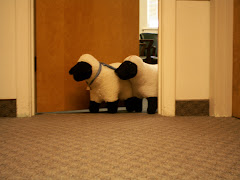Sheepherders have been known to talk to themselves even as they talk to the Good Shepherd. During Lent 2010, I’m using “A 40-day Journey with Martin Luther” as my daily devotional guide. Just a week or so into that annual 40-day Lenten journey, there was a question I imagined Jesus asking:
“So, Cathi, how’s it going with your soul?”
Well, for one thing, I know that Jesus really cares about what He’s asking and who He’s talking to. So, I can answer with confidence that He will understand what I mean.
“It’s going okay, Jesus.”
“Really? Okay?”
“Okay, but just because you’re here.”
Leave it to Jesus not to stop asking when I give Him an easy answer.
On a day like today, which is often, I marvel at and treasure what it took for the Apostles, the Early Christians, and the 16th century Reformers to get up, day after day, with no confidence of their own, only the confidence in Christ that is “the peace that transcends understanding.” (Phil. 4:7.) Luther’s Morning Blessing is just such a treasure. (For more on Luther’s morning blessing, go to http://www.oldlutheran.com/oldlutheran/page.php?page=confirmation&id=9 )
So, Pr. Sheepherder was praying the Morning Blessing … and she didn’t get far before Jesus started asking questions …
“ I give thanks to you, my heavenly Father, through Jesus Christ your dear Son …”
“And what is it you’re giving thanks for today, Cathi?”
Leave it to Jesus to cut to the heart of the matter.
“Today, Jesus, I’m grateful for a little phrase from Luther:
‘Glaubst du, so hast du.’
“You want to translate that?
“What, Jesus, you don’t speak German?”
“Just let me ask the questions, okay? Now, translate.”
“ It’s ‘ Believe it, and you have it.’ “
“And what does this mean, Cathi?”
“Hey, that’s my question!” Luther interjects.
(Forgive me for this little Lutheran insider joke. “What does this mean?” is a standard line that Luther used in teaching the chief matters of the Christian faith. His little boy Hans used to wander around, like lots of little kids, and ask “What is this?” So, “What is this” or “What does this mean?” followed by an answer was a standard part of Luther’s teaching in what ‘s known as Luther’s Small Catechism. But, I digress.)
Jesus continues ... “C’mon, Luther, let her answer now.”
And the holy conversation continues, morning after morning, day after day, Lent after Lent.
_____
‘ Believe it, and you have it.’
Pure and simple, the Law and Gospel rolled up into one thing: GRACE. If I had to get up every morning and depend on my own talent, charm, wit, insight, compassion and so forth in order to be good enough to receive God’s seal of approval, I’d be dead. If I had to depend on my own ability to believe God’s promise, I’d be only a dead woman walking.
Such is the beauty of GRACE: God’s unimaginable promises of forgiveness, new life in Christ, beginning now and never-ending, all delivered by the Holy Spirit makes it possible to receive, appreciate and believe that the gift is given for me and for all who believe Jesus.
GRACE: God’s Riches At Christ’s Expense
God’s Word forever shall abide,
No thanks to foes who fear it;
For God Himself fights by our side
With weapons of the Spirit.
Were they to take our house,
Goods, honor, child or spouse;
Though life be wretched away,
They cannot win the day.
The Kingdom’s ours forever.
A Mighty Fortress, the final verse
Text by Martin Luther
Amen and Amen.
-- Pastor Sheepherder




